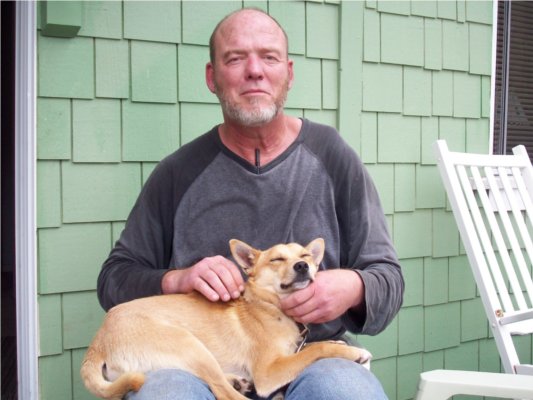Spring 2009
Table of Contents - Vol. V, No. 1
Poetry Interview Translations Fiction Book Reviews
Christopher T. George

C.E. Chaffin with his dog, J. Alfred Prufrock,
whom he describes as “my little English butler with a Japanese provenance.”
CTG: Could you say something about your influences? I know T.S. Eliot and Pablo Neruda are two of them. Do you wish to name any others?
CE: Jeffers, Frost, Strand, Roethke, Rilke. In mentioning them, I am naming poets I have consciously imitated. They are by no means all of my poetic influences, as opposed to poets I merely enjoy.
CTG: I was impressed that your book is dedicated to your late daughter, Rachel, whose death must have been a considerable loss and trauma to you and your wife Kathleen.
CE: If Rachel hadn’t died, I wouldn’t have dedicated the book to her. But the dedication to Kathleen would have stood. And isn’t all poetry really a rebirth from grief? Spring is the season of poetry, even if Eliot mocked the tradition in “The Waste Land.”
CTG: In regard to the demise of your web magazine, Melic Review, was it just the spammers that downed the site or were you having troubles (personal or whatever) that may have meant the end of the site in any case?
CE: It was three things. The barbarians overrunning the last civilized poetry board with no registration and thus no policing requirements; the failure to find a reliable webmaster; and my cyclical depression. But we were conscious about our end, and thus we called our last issue the “Death” issue, and published some fine work about death from a number of talented writers as our swan song. Incidentally, Chris, you are correct that the Melic archives do include some rare examples of my own poetry, although I want to point out that I did insist on never first-publishing staff.
CTG: I know you and your family lived in Mexico for some time. Do you want to say anything about your years in Mexico? I know your bio says you came back to California because your children were grown, but were there other factors? Why did you move there in the first place?
CE: Mexico was an experiment in trying to save your American home as a rental while living more cheaply in Mexico (we were house-poor). In this regard we failed. We came back because I really hated Mexico. I couldn’t take the heat, even at 6,000 feet., and I was always getting sick with amoebiasis.
CTG: How did living in Mexico influence your poetry?
CE: I got a localized feeling for Eliot’s “timeless moment” in the Amerindian culture of manana, although I think the imprecisions of living in Mexico would have driven Eliot crazy. Or crazier. I also read more Neruda and Paz and others in the original Spanish.
CTG: Now that you are retired from medicine, you both lecture on depression and lead one-on-one poetry tutorials. Would you care to comment on those activities?
CE: I’m a good guy to talk to if one is depressed. I have been there as a manic-depressive and also trained in psychiatry. Many poets have confided in me, which is to be expected, because, historically, about 20% of “name” poets are bipolar. It all comes with the territory: poet, doctor, madman.
I still tutor poets online, generally six weeks intensive for $300. I don’t do it for the money but for the pleasure of encouraging new voices.
© Christopher T. George
